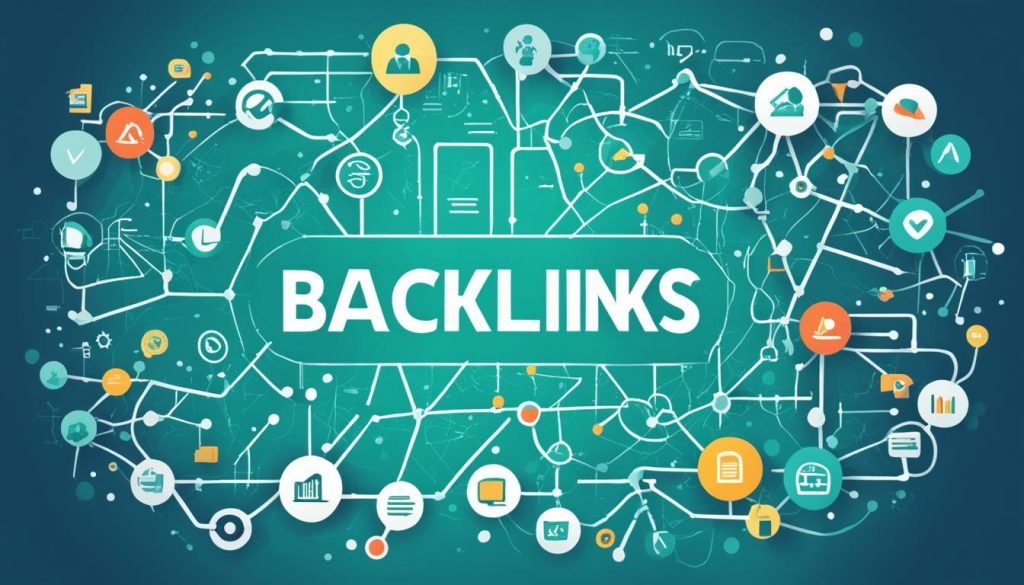Google likes websites that offer helpful info more than those with lots of links. So, knowing what helps your site rank higher is key. Yet, falling down the search list is easy, too. This guide will help keep your site’s reputation and visibility top-notch in Singapore.
Key Takeaways:
- Create original and valuable content to provide real value to users, avoiding penalties for low-quality sites.
- Build high-quality backlinks from authoritative websites to improve your website’s visibility and avoid link penalties.
- Use relevant keywords to optimize your content for search queries, enhancing its visibility and avoiding content penalties.
- Optimize meta tags to improve the display of your content in search results, avoiding technical penalties.
- Create engaging content that encourages user interaction and positive reception, improving your website’s visibility and avoiding penalties.
- Implement HTTPS to enhance website security and protect personal information, avoiding technical penalties.
- Monitor your website’s performance to ensure it is performing well in search results and identify any potential issues that could lead to penalties.
Understanding Google’s Penalty Algorithm
Google’s penalty algorithm is key in choosing good websites for search results. Its goal is to show users the best and most useful content. It punishes sites using shady SEO tricks. Knowing this algorithm helps site owners keep their content useful. This means avoiding penalties that can drop their search result rankings or kick them out altogether.
There are two main kinds of Google penalties: algorithmic and manual. Algorithmic penalties happen automatically after big updates. These updates (like Panda, Penguin, and Helpful Content Update) focus on bettering the search experience. They target sites trying to game the system. Manual penalties come from Google’s own people. They hit when a site breaks the Search Essentials rules.
Some penalties are for things like stuffing keywords, cloaking, hacked pages, thin content, doorway pages, bad links, and spam. To bounce back from these, site owners need a game plan. They should cut out keyword stuffing, make their site secure, boost content quality, and ditch bad links. By steering clear of these bad moves and focusing on what users want, sites can dodge Google’s penalties and keep their ranking.
Using tools like Google Search Console and Ahrefs can help spot and fix penalties. They provide stats on your site, links, and what might get you in trouble. Modating comments can also stop spam. Preventing user-created spam meets Google’s guidelines, helping you stay clear of penalties.
It’s crucial for website owners to get how Google’s penalty system works. This understanding is vital for staying highly ranked and trusted by search engines. By making sure their websites are user-focused and trustworthy, sites can stand out in today’s online world.
Providing Real Value to Users
Avoiding SEO penalties is crucial. Google likes websites with useful information and quality content. It values these over sites with just links.
Don’t just use meaningless keywords or fake content. Make sure your website offers helpful information. You can share insights on rare topics or interesting stories.
“Google penalizes websites that fail to provide value to users and prioritize low-quality sites,” says SEO expert Jane Williams. “To remain highly ranked in search, regularly publish informative and helpful content.”
Some website owners try to cheat search engines. They use low-quality or irrelevant content. But, this doesn’t help users. It also risks getting penalties from Google.
But, focusing on real value and useful info can boost your search rankings. This will make users trust your site more. They will come back for reliable information.
https://www.youtube.com/watch?v=ML8vfkJtqdU
To succeed, put your users first. Offering top-notch and valuable content is key. It builds a loyal audience and improves your site’s reputation and ranking.
Creating Original Content
Creating original content is key to stay ahead in search rankings without penalties. In today’s tough market, tech and SaaS companies often see their search rankings drop. This happens when they copy content from others.
Copying hurts not just your ethics but your website’s image and trust, too. To be a standout and build your brand, fresh and useful content is a must.—
A unique take on trends, new insights, and personal stories can set you apart. It draws your audience in. This helps you rank higher while making you an expert in your field.—
Original content should have deep research, expert views, and personal stories. Telling these tales gives real value and insights. Make sure it’s what your audience wants to read, so it stays relevant.—
Creating your own content helps avoid penalties and shows you strive for quality. Search engines love sites that offer valuable and new content. They reward such sites with better visibility and rankings.—
Watch out for accidental content duplication within your own site. Regular checks and quick fixes can stop this. It ensures only original content is seen by your users.—
Investing in original content isn’t just about avoiding penalties. It helps you pull in organic traffic, engage your readers, and lead in your industry. With quality material, you build a strong online presence.—
Table: Benefits of Creating Original Content
| Benefits | Description |
|---|---|
| Improved Search Rankings | Original content helps to boost your website’s visibility and search engine rankings, leading to increased organic traffic. |
| Establish Brand Credibility | Original content demonstrates your expertise and establishes your brand as a reliable source of valuable information. |
| Increase Audience Engagement | By providing unique perspectives and valuable insights, original content drives engagement and encourages audience interaction. |
| Build Long-Term Relationships | Creating original content fosters trust and loyalty among your audience, leading to lasting customer relationships. |
| Avoid SEO Penalties | Original content helps you maintain compliance with search engine guidelines and avoid penalties that can harm your online presence. |
Building High-Quality Backlinks
Think of backlinks as important votes for your website’s credibility. Aim to get these votes from respected sites. This helps your site rank better in search engines without getting penalized.
It’s better to have a few high-quality backlinks than many from low-quality sites. Look for links from sites that are known in your field. These will boost your site’s visibility in searches.
Don’t try sneaky tricks for more backlinks. Search engines will notice and might penalize your site. Instead, join trusted groups that can introduce you to legitimate sites. Here, you can find people willing to share your work or products.
To get great backlinks, try these tips:
- Create content that’s useful and interesting enough for people to share it.
- Write posts for other sites in your field.
- Team up with influencers and experts in your area.
- Share your knowledge on forums to earn more visibility.
- Ask well-known sites to mention you in their content.
It’s crucial to prioritize quality over quantity when it comes to backlinks. Linking too much to unreliable sites could hurt you. Stay focused on connecting with respected sites.
Benefits of High-Quality Backlinks
| Potential Benefits | |
|---|---|
| 1 | Improved search engine rankings |
| 2 | Increased organic traffic |
| 3 | Enhanced website credibility and authority |
| 4 | Expanded reach and visibility within your industry |
| 5 | More opportunities for collaboration and partnerships |
By focusing on getting high-quality backlinks, your website gains a lot. It helps it rank better, be seen more, and partner with others. This strategy is crucial for online success.

Using Relevant Keywords
Improving your website’s search rankings and avoiding search engine penalties is key. Use words your audience searches for. This makes your site more visible and attracts more visitors.
To find the right keywords, do some research. Use tools like Google Keyword Planner or SEMrush. Find keywords with high searches and minimal competition.
After finding your keywords, use them wisely. Don’t use too many in your content. Focus on creating quality content that fits naturally with your keywords. This approach keeps your readers interested and helps avoid penalties.
Here’s how to use keywords effectively:
- Put your main keyword in the webpage’s title tag.
- Add keywords to meta descriptions for users and search engines.
- Use keywords in header tags to help search engines understand your content.
- Place keywords in your content’s body naturally.
- When linking, use keywords in anchor text.
- Describe images with alt text using relevant keywords.
By applying these tips, you can boost your website’s search engine standings. Remember, valuable content for your audience should come first.
| Key Points | Details |
|---|---|
| Relevant Keywords | The words and phrases used by your target audience when searching online. |
| Keyword Research | Conduct thorough research to identify the most relevant keywords for your website. |
| Avoid Keyword Stuffing | Using keywords naturally and avoiding overuse can help you avoid penalties. |
| Title Tags and Meta Descriptions | Incorporate keywords into these elements to improve search engine visibility. |
| Header Tags and Body Content | Use keywords in header tags and content to enhance relevance and readability. |
| Anchor Text and Alt Tags | Include keywords in anchor text and alt tags to optimize links and images. |
Optimizing Meta Tags
Meta tags are key for making your website seen on search engines like Google. They help match your content to what people are looking for. To use them well, start by finding the right keywords for your topic.
These tags give a quick peek at what your page is about. They have titles, descriptions, and keywords. Titles are short and should have main keywords. Descriptions are like your page’s sales pitch. Keywords are terms about the content.
Meta Titles
Your meta title acts as your page’s headline on search results. It needs the important keywords to show up in searches. But, don’t just stuff it with too many keywords. Make it sound interesting, too.
Meta Descriptions
The meta description is a short intro to your page’s content. Use it to tell people what they’ll find when they click. Don’t forget to include keywords here, too. Aim for about 155-160 characters.
| Benefits of Optimized Meta Tags |
|---|
| Improved visibility on search engine results page (SERP) |
| Increased click-through rates |
| Better user engagement and reduced bounce rates |
| Enhanced targeting of relevant audience |
Working on meta tags is a vital step in SEO. It makes your site easier to understand for search engines. But, good content is the real star. Remember to follow Google’s advice to stay out of trouble and make your visitors happy.

With the right meta tags, more people find your website. Keep keywords at a good level with tools like Yoast or SEMrush. Remember: too much of a good thing can be bad. If your site got into trouble before, fix it by changing content and how you link to other pages.
When writing, use about 1 keyword for every 400-450 words. Mix in related terms to vary the text. By doing this and getting meta tags right, you’ll see your site climb the search rankings, drawing in more visitors.
Creating Engaging Content
Making your audience engage with your website is key. Good content boosts your site’s views and search rankings. To draw people in, offer valuable, interactive content. This will keep them interested and coming back for more.
1. Use Language that Resonates
Talk in a way that your audience connects with. Skip the fancy words that might confuse them. Using simple, relatable language helps you build a bridge to your readers.
2. Provide Value through Informative Articles
Write articles that teach or solve problems for your readers. This makes your site a go-to for valuable info, which builds trust. Clear, useful content keeps visitors coming back.
3. Incorporate Interactive Elements
Add fun things like quizzes or surveys to your site. They make the visit more engaging and personal. This holds interest and makes users feel included.
“Interactive content invites users to actively engage with your website, encouraging them to spend more time exploring your offerings.”
4. Create Compelling Stories
Stories are powerful because we naturally connect with them. Sharing tales or success stories can touch your readers. It builds a lasting, emotional bond with them.
5. Visualize Data with Infographics
Make data easy to understand with cool infographics. They are great for showing stats or steps in an interesting way. Infographics help your visitors grasp and remember information better.
6. Encourage User-generated Content
Let your audience share their thoughts or stories. This creates interaction and boosts your site’s credibility. It also brings in new, fresh perspectives your readers might enjoy.
Engage visitors with your content to increase traffic. Focus on providing value and using interactive features. Compelling stories also make your site stand out. These strategies will set your website apart in today’s competitive digital world.
Implementing HTTPS
Adding HTTPS to your website is key for keeping it safe and boosting your SEO. In our world, where privacy and guarding data matter a lot, HTTPS is big for SEO. Google sees it as top-notch for where your site shows up in searches.
Moving to HTTPS can really help your site’s health in search rankings. It might make you rank higher than those without it. As more people go online with their phones, and Google favors websites that work well on mobile, this move is super important.
Websites that don’t switch to HTTPS might not do as well in searches. They could lose visitors because their site is marked as “Not Secure”. Plus, studies show a lot of people will leave a site if they see it’s not secure.
If your website lacks HTTPS, browsers might show security warnings. This scares people and can make them doubt your site. This doubt can hurt your site’s trust and make Google think your site isn’t very good, lowering your rank.
Using HTTPS is a great way to build trust with the people who visit your site. It lowers how many people leave right away, which is good for search result rankings. Your visitors’ data is kept safe, which helps them feel better while using your site.
Also, HTTPS can make your site load faster. This is important for your site to do well in searches and to keep visitors interested. Having HTTPS often means better speed, which is a plus for everyone.
Remember, getting HTTPS means getting an SSL certificate. This confirms that your site is who it says it is, making visitors trust your site more.
Why HTTPS Matters:
“HTTPS not only protects user data, but it also builds trust, reduces bounce rates, and improves SEO rankings. Ensuring website security through HTTPS is a necessary step in today’s digital landscape.”
Impact of HTTPS on SEO
| Benefits | Statistics |
|---|---|
| Potential for higher rankings | HTTPS is a ranking signal indicated by Google |
| Decline in search rankings | Websites not transitioning to HTTPS may experience a drop in organic traffic |
| Increased bounce rates | 82% of respondents are likely to leave a website upon seeing a “Not Secure” warning |
| Negative impact on user trust | Security warnings in browsers due to lack of HTTPS can harm user trust and SEO rankings |
| Affects search engine rankings | High bounce rates send negative signals to search engines, affecting rankings and relevance perception |
| Improved page load speed | Switching to HTTPS positively impacts website performance and load times |
Implementing HTTPS is critical for your website’s safety and boosting SEO. It ensures a secure link and protects data, which builds trust and reduces bounce rates. Making the change to HTTPS will enhance your search results and your users’ experience.
Conclusion
To keep your spot in search engine rankings and dodge SEO penalties, you need solid SEO strategies. It’s vital to offer real value by creating original, meaningful content. You should also focus on building top-notch backlinks and doing keyword research.
Don’t forget to work on your meta tags and craft content that keeps people engaged. Adding an HTTPS layer to your site keeps it secure. Plus, keep a close eye on how your website performs.
Checking your backlinks is crucial, and work hard to get links from trusted and relevant sites. That helps avoid penalties. While getting over a Google penalty takes time, sticking to the best SEO practices will help you bounce back.
Google loves sites that have valuable, unique content. So, focusing on quality writing is key to winning at SEO. Also, making sure your site looks good and works well on mobiles is a must. Be sure it’s fast, responsive, and looks good on different screens.

